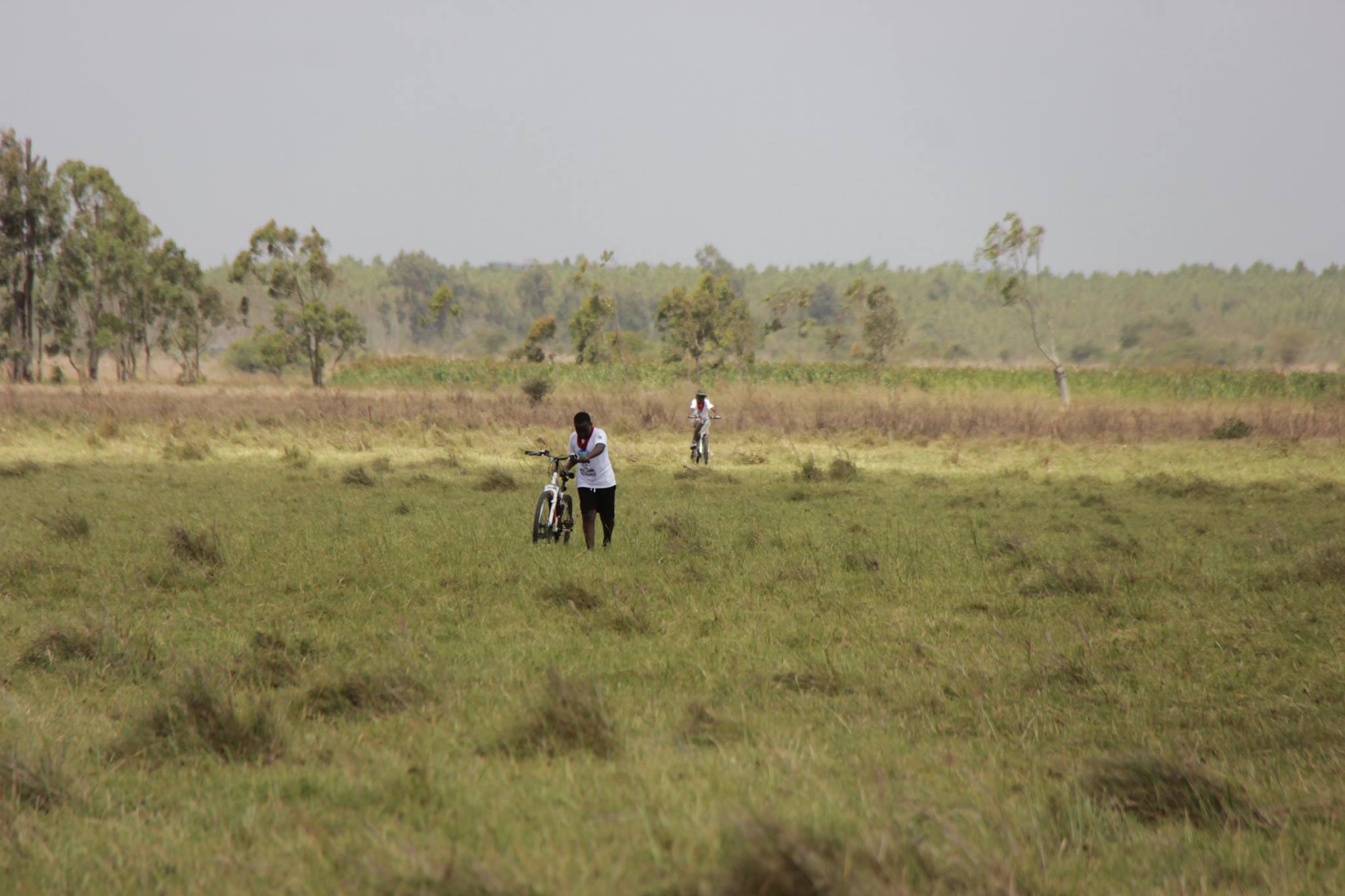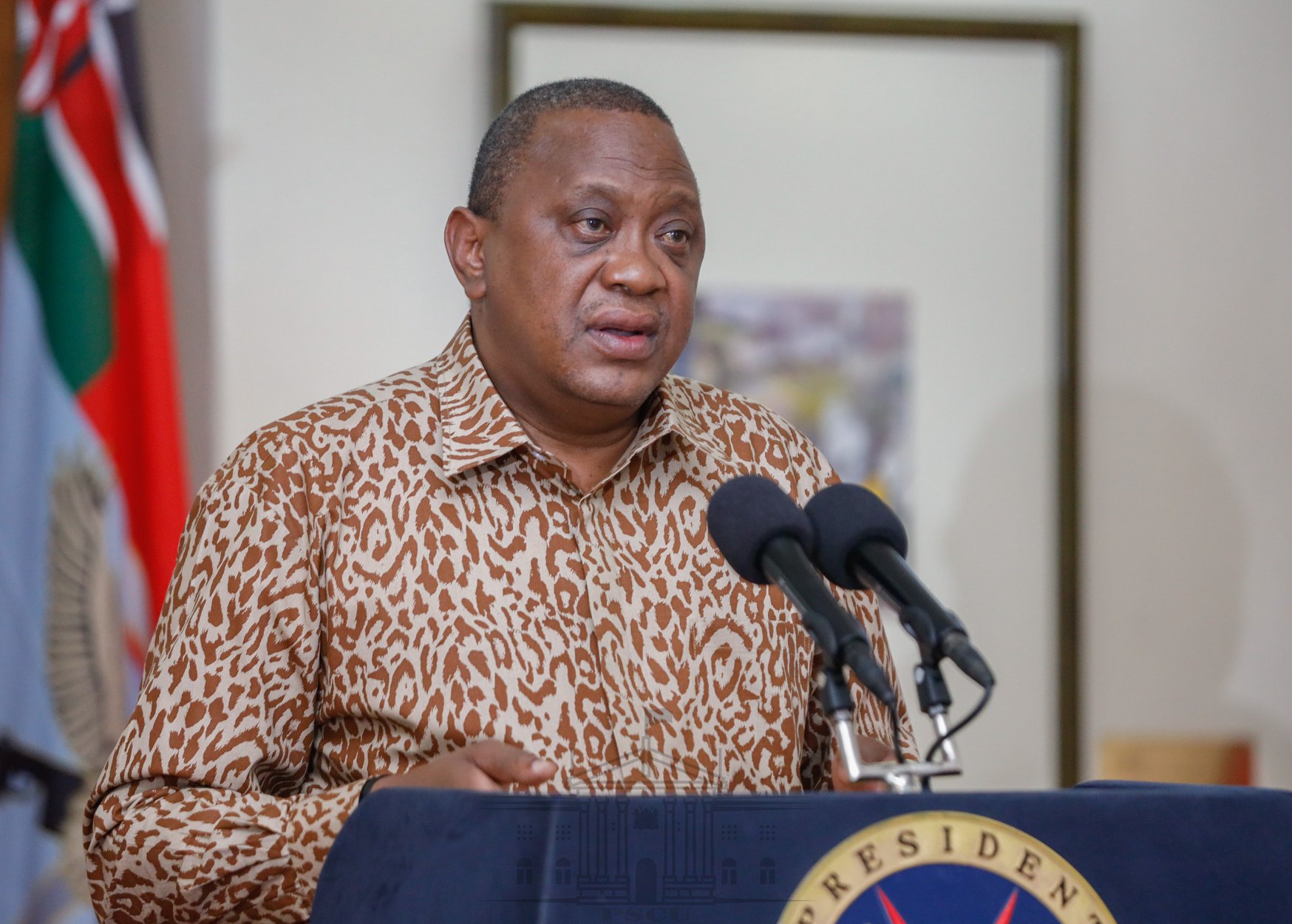


Cyclists on the Kenyatta family-owned 10,000-acre Gicheha Farm in Ruiru, Kiambu County. On 27 March, 2023 a section of the farm was invaded by youths hired allegedly by senior government officials. (Photo courtesy: Brookside Dairy).
Northlands. An expansive undulating plateau on the outskirts north of Nairobi and south of Ruiru town in Kiambu County. Consisting of a getaway shooting range – a “Pimper’s Paradise” for Uhuru Kenyatta and his socialite friends – Northlands conjures images of a modern-day Wanjohi Happy Valley, reminiscent of the hedonistic British settler community of the 1930s and 1940s. Until two months ago, it was hardly known to the Kenyan public.
But when television cameras beamed images of bands of youth arriving en masse at the farm armed with machetes on the morning of 27 March, 2023, it brought the Kenyatta family’s prodigious land holdings back to the forefront of public consciousness.
The dramatic scenes of youth carrying away animals belonging to Kenya’s former president and damaging property on his 7,700-acre demesne evoked the political fault-lines that have been brewing in central Kenya since Jubilee’s victory in 2013: an angry, economically disenfranchised youth no longer willing to tolerate the propertied dominance of its political betters, least of all the nation’s founding ‘dynasty’ and its broken promises of prosperity.
If the images captured were ones of youth rebellion, then it is worth remarking that this is exactly how the Northlands invasion was supposed to look. This was a political stunt arranged for the cameras. What the Kenyan populace got to see was the Dorper sheep (a South African crossbreed) that was being skirted away by frustrated youth, who themselves had been ferried in from towns further afield in central Kenya and the neighbouring Ruai. Reared for its meat, the sheep is exported to the Middle East countries of Saudi Arabia, Qatar and the Emiratis. A ram costs 45,000 KES. The young men who carried them away were alleged to have been each paid 3,000 KES for their trouble.
The brief from their minders was very clear and time-specific: cross into the land, cut down some trees, steal some animals, but do not occupy the land. The subtle message to the Kenyattas: if you continue bankrolling the opposition Azimio la Umoja’s protest rallies , we shall squat on the land.
The shock of many Kenyans and media voices was the fact that the orchestrated invasion happened in the glare of all and sundry: “Who planned it? Where was the security? Why the attack?”. But within the Kikuyu community, that such a land invasion could be imagined in the first place spoke to one of the striking aspects of the country’s contemporary politics in the wake of Ruto’s 2022 presidential victory: The de-mystification of the Kenyatta family and its claims to political ascendancy, an ascendency that dates back to the colonial period.
In the heyday of Jomo Kenyatta’s Kenya Africa National Union (Kanu) one-party state, Charles Njonjo, the unrepentant anglophile and post-independence Kenya’s most powerful Attorney-General, had decreed that to imagine the death of Jomo Kenyatta was a treasonable offence. To imagine trespassing his family’s land has, to extend the edict, continued to be regarded as an act of heresy. That is, until the Northlands invasion.
The Northlands Invasion is emblematic of how President William Ruto’s new ‘populist’ moment has reignited land politics within central Kenya’s ethnic Kikuyu community. The most populous ethnic group in the country and the bedrock of political power in Kenya, it carried its first son, Uhuru Kenyatta, to two albeit contested electoral victories in 2013 and 2017.
Economic malaise and frustration with Kenyatta’s Jubilee Party not only paved the way for Ruto’s victory in 2022 – the triumph of his ‘Hustler Nation’. It has also thrown into question the landed wealth of what Ruto has characterised as Kenya’s ‘dynasties’. The fragile political hegemony of the Kenyatta family is being increasingly questioned, and new political space for land claims against the largest landowners like the Kenyattas is beginning to emerge – in the densely populated central Kenya region, but also beyond. A growing will to challenge landed inequalities is coming to the political fore as poor Kikuyu bristle at the Kenyatta family’s much-publicised landed wealth, and Ruto’s Kikuyu allies who are animating old histories of land struggle, with contemporary consequences.
The demystification of the Kenyatta dynasty

Former president, Uhuru Muigai Kenyatta. (Photo courtesy: State House, Nairobi).
Brought on by protracted economic malaise, unmet expectations of prosperity, and a feeling that his family were accumulating enormous private wealth at their own direct expense, Uhuru’s support in central Kenya had been draining away in the years running up to Ruto’s 2022 victory.
In 2018, barely a year after Uhuru’s re-election, Peter’s interlocutors from peri-urban Kiambu were lamenting their decision to return him to office. ‘Man, this tano tena – it’s shit!’, claimed Mwaura, a 22-year-old jobless graduate, evoking the ‘five more years’ slogan of the Jubilee government he had voted for, and to which he now attributed his struggles: countless job rejections and a life of odd jobs pursued in the informal economy. Rising commodity prices, VAT increases on fuel, and a government crackdown on the trade of counterfeit goods added fuel to the bonfire of Jubilee eclipsing popularity.
This fomenting discontent rippled out in the by-elections of 2021. Soon after the July 16, 2021 Kiambaa by-election in Kiambu County, occasioned by the sudden death of its MP, Paul Koinange, who had died on March 31, Dauti had a long chat with one of its richest constituents, a landowner from Ruaka.
“The myth of the Kenyatta family has been (finally) busted,” said the septuagenarian. “Believe me when I tell you the Kikuyus are done with the family.” The hotly contested seat was won by the United Democratic Alliance (UDA) candidate, a fledgling party recently formed by then Deputy President William Ruto.
“The ruling Jubilee Party defeat was a contempt card that said, ‘Uhuru we hate you. We don’t want anything to do with you. Just go away.’ I’ve lived all my life in Kiambaa, and I’d never witnessed this kind of antipathy towards the Kenyattas”.
Uhuru’s fading influence in the central highlands had been spurred by the 9 March, 2018 ‘Handshake’ with Raila Odinga, and the sense amongst Kikuyu voters that Uhuru had ‘betrayed’ his former running-mate Ruto. On top of that sleight of hand, Uhuru appeared to be asking Kikuyu voters to forget the animosity-fuelled campaign of 2017, when he had faced-off against Raila. Uhuru had called his veteran opponent a ‘kĩmũndũ’, a ‘monster’ (lit., a big bad person) on the campaign trail. A ‘bully and a person Kikuyus couldn’t trust’ was how Uhuru framed his utterance, a carefully chosen epithet that he likely knew evoked histories of anti-Luo sentiment dating back to his father’s government, a tradition of hate and mistrust that castigated Nyanza as a hotbed of anti-Kikuyu resentment.
In 1969, Mzee Kenyatta – anxious about the political influence of Jaramogi Oginga Odinga’s outlawed Kenya People’s Union (KPU) – summoned Kikuyu to his home in Gatundu to have them take ritual oaths that told them that the presidency should never fall into Luo hands. Such histories of fear, commonly described in Kenya as ‘tribalism’, have shaped voting patterns in central Kenya ever since, carrying Uhuru to two victories against Raila in 2013 and 2017. Uhuru’s attempt to rapidly undo this history compounded perceptions of him as a meddling, ‘lame duck’ president with an unwelcome and undue influence in the region’s choice of leader.
As it happened, the Kiambaa by-election was won by a razor-thin margin and, as is wont with many by-elections, poorly attended. “But that wasn’t the point”, noted the Ruaka tycoon. “At a time when President Uhuru Kenyatta needed to stamp his authority, both as the President and the Kikuyu people’s ultimate leader, he faced a backlash, a recalcitrant voter now angry with him who, barely four years ago, had emotionally voted for him,” said the mzee. The by-election had come hot on the heels of another – in Juja constituency on May 19, 2021 also in Kiambu County. Juja, like Kiambaa, is emotionally linked to the Kenyatta family: The constituency for the longest time had been represented by a Kenyatta family member; Mzee Jomo Kenyatta’s son, his nephew and brother-in-law.
Whilst these by-election results reflected Kenya’s worsening economic fortunes under Jubilee, voters’ ire was concentrated on the Kenyatta family and their dominance of the region’s politics through their historic, landed wealth.
The wealthy realtor had been a senior civil servant in Mzee Jomo Kenyatta’s government. He acquired much of his prime land during this era and is eternally grateful to the elder Kenyatta. “Kiambaa isn’t the Kenyatta family’s backyard, it’s where their in-laws hail from. It’s home. As long as the Kenyattas were revered, the Koinanges too were revered.”
The Kenyatta family own property and huge tracts of lands in Juja. It is not absurd to say, they “own” nearly half the electorate, whom they employ as wage labourers. When President Uhuru’s Jubilee party candidate lost to a candidate from a party sponsored by UDA (the People’s Empowerment Party (PEP) – the briefcase political party of former Kenyatta ally-turned-foe Moses Kuria), he is said to have been livid; Mama Ngina called a crisis family meeting.
Both by-elections were a precursor and a premonition of the much-anticipated 9 August, 2022 general election. “Uhuru’s humiliation in Juja and Kiambaa are a bad omen,” opined the Ruaka realtor at the time. “Who knows what that hate can be channelled into in the future against the Kenyatta dynasty?”
If the election of 2022 rescinded Kenyatta political dominance, the Northlands Invasion attacked its landed origin. After the raid on Uhuru’s signature prime land, Dauti recalled his conversation with the realtor: “What the Juja and Kiambaa electorate did was to demystify the Kenyatta family. The myth around the Kenyatta family that they were untouchable, hence couldn’t be confronted, had been broken.”
Histories of Injustice

Protesters at the weekly Monday protest marches in Nairobi, March 2023. (Photo courtesy: Pauline Njoroge social media)
‘Ithaka na wĩathi’ – ‘Land and Freedom’ – the call-to-arms of the Kenya Land and Freedom Army, better known by its more familiar moniker: the Mau Mau. The State of Emergency declared by British colonial authorities in late 1952 during the Mau Mau uprising began a period of violence and forced detention that may have left as many as 25,000 dead. The conflict was animated not only by desires to rid the country of British colonial government, but also of concrete desires amongst poor and landless Kikuyu to find material redress in the wake of the era’s economic privations.
The alienation of land to White settler farmers at the dawn of the century had brewed a crisis of landlessness in the demarcated ‘African reserves’, and poor Kikuyu struggled to support households on limited land and low wages. As much as it was a political movement, Mau Mau began as a youth rebellion and became a civil war, one in which the ‘have nots’ sought to reclaim their land from the colonial government and its Kikuyu Home Guard allies.
In the wake of independence, these claims were reversed, and Mau Mau aspirations for restitution were side-lined by the elder Kenyatta’s ‘willing buyer, willing seller’ policy that allowed the distribution of land to be hijacked by wealthy Kenyans, especially the Kikuyu elite that surrounded Kenyatta. Central Kenya’s enormous tea plantations that sail across the hills of the Aberdares and beyond are the result of this history – one where elite capture emerged victorious.
These seemingly forgotten legacies of struggle are being resurrected. As the Kikuyu oligarchy ran amok, Ruto’s victory, and the presence of Deputy President Rigathi Gachagua at his side, appears to have suspended their hold on state power. Gachagua himself has claimed descendance from Mau Mau fighters, openly sympathising with the predicament of its present-day survivors. ‘Descendants of Mau Mau fighters live in deplorable conditions despite the sacrifice of their grandparents,’ Gachagua has stated.
The possibility of anti-elite sentiments triggering reprisals appear to have awakened fears amongst the Kenyattas that their substantial landholdings are increasingly open to political question. Mama Ngina, the family matriarch and Uhuru’s mother, took it upon herself both to reward the Mau Mau veteran Field Marshal Muthoni Kirima with a new house, as she offset her Sh4.7 million bank debt, whilst simultaneously condemning ‘fake’ Mau Maus who are stirring stirred political trouble.
In the wake of Uhuru Kenyatta’s 2022 electoral loss to Ruto, it is not only his political dominance that has been challenged, but his family’s private, landed wealth.
“The Kikuyus are gleeful”, a middle-aged lady from South Kinangop in Nakuru County, 100-odd kilometres from Ruiru, told Dauti. “We don’t have land here in Kinangop because we’ve been squashed to a corner. The Kenyatta family owns land that stretches from here to their ancestral home in Gatundu. How can one family own so much land to the detriment of the others?
“In Rongai (Nakuru County), they have expansive land and yet our people are starved of land. That [Ruiru] land (the 9000-acre Gicheha farm) should be excised and given to the people. Let me tell you, I can’t wait for that day.”
The post-2017 elections’ falling out between President Uhuru Kenyatta and the Kikuyu electorate had led to the breaking of a taboo observed for many years: casting aspersions on the family’s humongous land holdings. “It’s not that we didn’t know all that Kenyatta land is grabbed land,” said a mzee, who is actually a friend of the family, “But as long as they didn’t spit in our faces, we let it be and ignored the fact.”
Yet, the 27 March Northlands incident sent a terrifying message to the landed gentry and Kikuyu propertied class. As one told Dauti; “if they can (brazenly) do this to the Kenyattas, what would stop them from entertaining other ideas once they are done with Uhuru? It was very frightening and not good.at all. Whoever did this probably doesn’t know what a class war is all about.”
The new anti-elite land politics
The Northlands Invasion has served as a reminder to the central region’s Kikuyu elite that ‘the land question’ has not been forgotten amongst its people. Enabled by the de-mystification of the Kenyatta family and Gachagua’s open support for Mau Mau squatters, that such an event could be imagined in the first place constitutes a shot across the bow of the old Kikuyu oligarchies.
Meanwhile, a new appetite for land seizure appears to be simmering at the grassroots. Kenya’s history of elite level ‘land grabbing’ is well documented. But in recent weeks, several actions of trespass and reclamation have taken place across Kenya involving large numbers of youth.
Like the Northlands invasion, such instances speak to the ongoing co-optation of unemployed youth into the games of elite-level politics – their availability for hire, just as they were recruited to rallies on the campaign trail. But piecemeal though they are, these actions also reflect genuine desires to challenge inequalities of access to land, desires animated by knowledge of histories of elite capture that continue to circulate. In a moment of economic malaise, where oligarchic wealth in Kenya is more overt than ever, it seems logical to expect more, not less, of such seizures from below.
Toward the August 2022 elections, some Kikuyu youth from Kiambu County had told Dauti how they yearned to invade the Kenyatta family land, if ever a chance availed itself, and own, as it were, also, a piece of the pie. “They own so much land and we know it’s all grabbed land that belonged to our forefathers.”
Source
Language of the news reported
Copyright © Fuente (mencionado anteriormente). Todos los derechos reservados. El Land Portal distribuye materiales sin el permiso del propietario de los derechos de autor basado en la doctrina del "uso justo" de los derechos de autor, lo que significa que publicamos artículos de noticias con fines informativos y no comerciales. Si usted es el propietario del artículo o informe y desea que se elimine, contáctenos a hello@landportal.info y eliminaremos la publicación de inmediato.
Varias noticias relacionadas con la gobernanza de la tierra se publican en el Land Portal cada día por los usuarios del Land Portal, de diversas fuentes, como organizaciones de noticias y otras instituciones e individuos, que representan una diversidad de posiciones en cada tema. El derecho de autor reside en la fuente del artículo; La Fundación Land Portal no tiene el derecho legal de editar o corregir el artículo, y la Fundación tampoco espalda sus contenidos. Para hacer correcciones o pedir permiso para volver a publicar u otro uso autorizado de este material, por favor comuníquese con el propietario de los derechos de autor.
